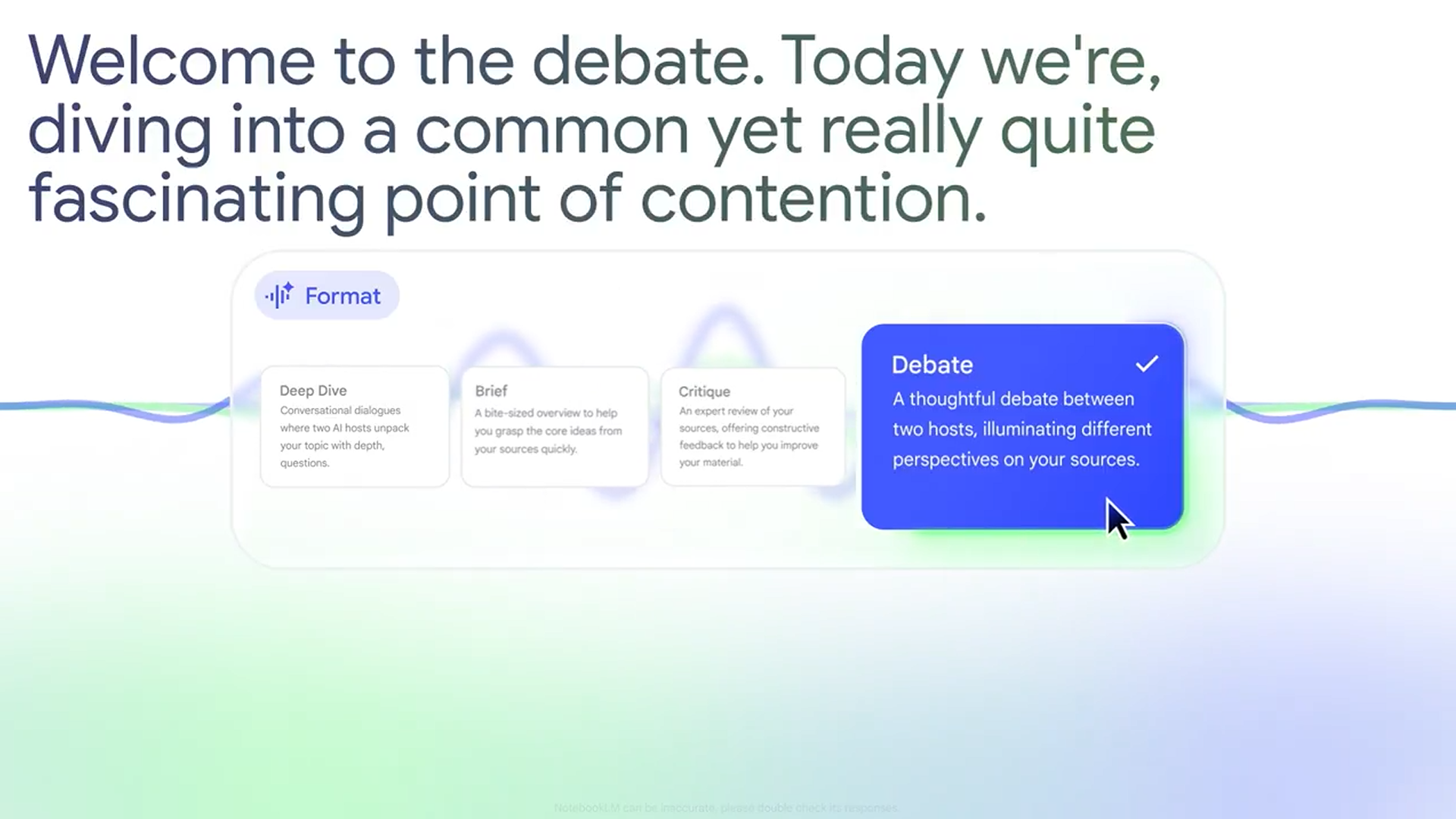Google NotebookLM's AI podcast hosts can now get into an argument over your notes
AI Audio Overviews are getting more animated and opinionated

- Google’s NotebookLM Audio Overviews have added Brief, Critique, and Debate formats
- The new formats provide more animated feedback and argumentative dialogues
- The update moves the platform toward more interactive audio AI setups
The AI-produced 'podcasts' from Google's NotebookLM are now a lot chattier when discussing the notes and sources you upload to the platform.
You can now hear the 'hosts' discuss in four distinct audio formats, each designed to suit different learning styles, moods, and attention spans. Instead of just the conversational “Deep Dive,” you can also use the “Brief,” “Critique,” and “Debate” forms. Together, they signal a move toward more flexible AI learning system, not just a reliance on a single method of sharing information.
The concept behind Audio Overviews has always been to transform written material into something you can listen to when you’re multitasking or prefer to learn by listening. Up until now, the audio experience has been fairly one-size-fits-all. You got what amounted to a laid-back podcast: two AI voices walking through your content conversationally, often with a helpful but distinctly bland tone. The new modes change that dynamic, allowing users to select not just how long the audio lasts, but what kind of intellectual experience they want from it.
🚨Rolling out NEW audio overview formats: (Default) Deep Dive: a thorough examination of your sourcesBrief: 1-2 minute, bite-sized overviewsCritique: an expert review, offering constructive feedback on your materialDebate: a thoughtful debate between two hosts pic.twitter.com/m3z3yASMyFSeptember 2, 2025
As the name suggests, the “Brief” format makes for a quick summary of no more than a couple of minutes. The “Critique” approach is more of a constructive feedback on what you've uploaded, which is more useful if you've written the material as opposed to trying to learn from existing essays. And asking for the “Debate” mode gets the two AI hosts together not to agreeably discuss information, but to take opposing positions on something central to the uploaded data.
You can change formats by tapping the pencil icon in the Audio Overview card and selecting your preferred style. That's where you can customize options like tone, language, and length, too.
Debating AI

The significance of the update goes beyond just how people set up AI voices to fight. It shows how AI educational tools are evolving from static summarizers into dynamic assistants. It also suggests that Google is betting that people want to listen to their own documents like they do podcasts and that they'll want those documents to speak in different tones, depending on what they’re trying to accomplish.
There’s also the accessibility angle. Audio formats can be game-changing for people with visual impairments or reading challenges, or even just users who process information better by ear. Offering varied formats could help tailor the cognitive load, giving users a chance to decide what kind of mental energy they want to expend.
Sign up for breaking news, reviews, opinion, top tech deals, and more.
Though still dealing with quirks and errors like all AI tools, the promise of the new Audio Overview formats lies not just in making the summaries better, but in making them work with more diverse sets of data. The “Debate” format demands the AI process not just facts, but logical refutations. The obvious benefit is that more people will get better at spotting holes in their own logic. But that might mean people don't think beyond what the AI suggests, and critical thinking is, well, critical to life.
The updated Audio Overviews are rolling out in the U.S. but will likely go global soon.
You might also like
- I tried using NotebookLM’s new AI Video Overviews and ended up with some usefully informative, but rather dull PowerPoint presentations
- Google will turn those long documents into your next favorite podcast
- I fed NotebookLM a 218-page research paper on string theory and the podcast results were mind-blowing

Eric Hal Schwartz is a freelance writer for TechRadar with more than 15 years of experience covering the intersection of the world and technology. For the last five years, he served as head writer for Voicebot.ai and was on the leading edge of reporting on generative AI and large language models. He's since become an expert on the products of generative AI models, such as OpenAI’s ChatGPT, Anthropic’s Claude, Google Gemini, and every other synthetic media tool. His experience runs the gamut of media, including print, digital, broadcast, and live events. Now, he's continuing to tell the stories people want and need to hear about the rapidly evolving AI space and its impact on their lives. Eric is based in New York City.
You must confirm your public display name before commenting
Please logout and then login again, you will then be prompted to enter your display name.